- Details
-
Published on Wednesday, 20 December 2017 18:15
Interview with: Krieg, Eisenfaust
Conducted by: Felin Frost
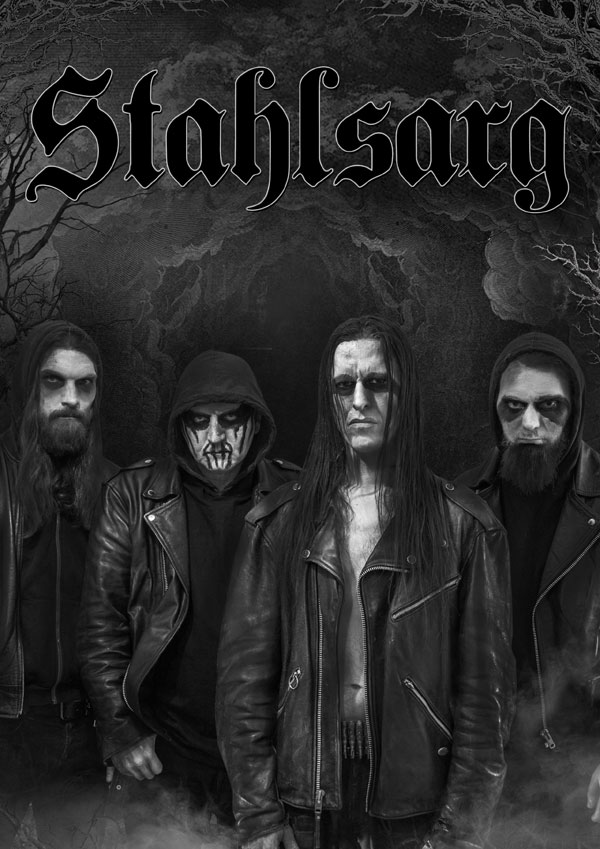 From UK comes Stahlsarg to the European black metal scene, like a bomb crushing everything in front of them they deliver a massive sound that blends technical, yet atmospheric black metal with blasting death metal. The band was formed in 2013 and almost immediately took to the road to travel through the UK and Europe sharing their black metal sound on the stage. After supporting pioneers of Norwegian black metal, Mayhem, on their sole UK date in London, storming Belgium with Italian black metallers Handful Of Hate and joining black metal band Excruciate 666 in France, they were also honoured to grace the Sophie Lancaster stage at Bloodstock 2014, warming up the crowd for Satan, enjoyed Beermageddon Festival in Birmingham and Belgium’s No Compromise Metal Festival alongside headliner Crystal Viper, they finally released their debut album, Comrades In Death, via the Danish label Mighty Music in October 2015. Now, two years after and many gigs in between, Stahlsarg released the magnificient second album, Mechanisms Of Misanthropy, through the mighty Non Serviam Records on 31st October 2017. The album features a guest vocal from Kim Dylla (A Winter lost, Gwar, Kung Fu Dykes) and an arrangement from Brian Moss from Vicious Pink. This is a black metal album where all the instruments have found a particular equilibrium proportioning definition to each song generated (read the review over HERE). Stahlsarg's line-up consists of Eissturm (vocals/guitar), Krieg (guitar), Destruction (bass) and Eisenfaust (drums). Read the interesting interview done with bands guitarist Krieg and drummer Eisenfaust, and discover more about this band which is on a mission to conquer the European extreme metal scene.
From UK comes Stahlsarg to the European black metal scene, like a bomb crushing everything in front of them they deliver a massive sound that blends technical, yet atmospheric black metal with blasting death metal. The band was formed in 2013 and almost immediately took to the road to travel through the UK and Europe sharing their black metal sound on the stage. After supporting pioneers of Norwegian black metal, Mayhem, on their sole UK date in London, storming Belgium with Italian black metallers Handful Of Hate and joining black metal band Excruciate 666 in France, they were also honoured to grace the Sophie Lancaster stage at Bloodstock 2014, warming up the crowd for Satan, enjoyed Beermageddon Festival in Birmingham and Belgium’s No Compromise Metal Festival alongside headliner Crystal Viper, they finally released their debut album, Comrades In Death, via the Danish label Mighty Music in October 2015. Now, two years after and many gigs in between, Stahlsarg released the magnificient second album, Mechanisms Of Misanthropy, through the mighty Non Serviam Records on 31st October 2017. The album features a guest vocal from Kim Dylla (A Winter lost, Gwar, Kung Fu Dykes) and an arrangement from Brian Moss from Vicious Pink. This is a black metal album where all the instruments have found a particular equilibrium proportioning definition to each song generated (read the review over HERE). Stahlsarg's line-up consists of Eissturm (vocals/guitar), Krieg (guitar), Destruction (bass) and Eisenfaust (drums). Read the interesting interview done with bands guitarist Krieg and drummer Eisenfaust, and discover more about this band which is on a mission to conquer the European extreme metal scene.
F.F.: First of all I would like to thank you for your time dedicated to answering my questions. Stahlsarg draws my attention not only for the excellent quality of the sonorous work so far, as well because of the theme addressed in the lyrics. Now, congratulations also for a new album, Mechanisms Of Misanthropy! Tell me how are you satisfied with the final product?
Eissenfaust: We're more than satisfied! We put a lot of time and effort into the writing, recording, and producing of this album, making sure each track really means something and plays a part in the Mechanisms Of Misanthropy story as a whole. In playing together for so many years, we're tight musically, and having all of us being involved in the writing process from start to finish, we've created something I think we're all proud of, that allows space for a real span of ideas and influences.
F.F.: Analysing Mechanisms Of Misanthropy, I realized from the outset that it is a complex endeavour, both technically and emotionally. How was it for you making this album?
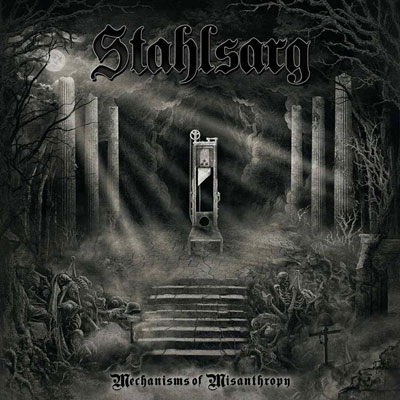 Eisenfaust: We had a vision, and trying to achieve that definitely pushed us out of our comfort zone at times. I'd be lying if I said this album wasn't hard work - and that's what's made the finished product so rewarding. As well as striving for a balance of heavy riffs with fast drum beats and a slower groove, we wanted to tell a story. We were meticulously writing parts together to create drama, and atmosphere, bouncing off one another and having input across each other's instruments. We fed off each other, of course, but working with Danny meant that we had this extra sounding post. Not only did he approach the recording and production with an open-mindedness that afforded us the opportunity to almost experiment with all the layers and added parts; but he was ready to critique and push us into getting the best out of the band, whilst staying true to what we all hoped our album would be.
Eisenfaust: We had a vision, and trying to achieve that definitely pushed us out of our comfort zone at times. I'd be lying if I said this album wasn't hard work - and that's what's made the finished product so rewarding. As well as striving for a balance of heavy riffs with fast drum beats and a slower groove, we wanted to tell a story. We were meticulously writing parts together to create drama, and atmosphere, bouncing off one another and having input across each other's instruments. We fed off each other, of course, but working with Danny meant that we had this extra sounding post. Not only did he approach the recording and production with an open-mindedness that afforded us the opportunity to almost experiment with all the layers and added parts; but he was ready to critique and push us into getting the best out of the band, whilst staying true to what we all hoped our album would be.
F.F.: Is the name of the band, Stahlsarg (steel coffin), a direct reference to the themes of the lyrics presented so far? Or is there a more subjective particular meaning?
Krieg: Some of the tanks during WW2 could take a direct hit and still look in full working order, however there would be a hole where the shell had hit the tank. The shell typically exploded inside the tank killing all the occupants. Often the Russians would get cutting equipment and cut a hatch open to remove the deceased and wash out the charred remains inside so they can put the tank back into use. More often with the pace of war, the tank was left behind and its dead were entombed in their steel coffin. This term also relates to uboats and submarines that had been hit by torpedoes and depth charges and had sunk to the ocean floor with its occupants. We felt that this term, ‘steel coffin’ could be a good name for our band but we felt it sounded more interesting in the German language.
F.F.: Your lyrics are based on historical facts of World War II and are built flawlessly and smartly. Surely there are thousands of aspects that can still be explored in new albums, what do you think about it, will you follow this theme in the future as well?Krieg: Yes you are completely correct some reviewers don’t have the vision or think it through like you obviously have. I’m sure many people will just listen to the music without contemplation of the lyrics. Even if nobody read the lyrics, I would still have to write the same detail in the lyrics and have them in the booklet just for my own satisfaction. The same applies with ensuring the lyrics can be heard with clarity when you listen to the album. For those who want to delve into the history or who already know it, I want people to be able to visualise the history as they hear the song. Every year I find time to travel to other countries that have a historical interest to me in order to help develop and inspire the song writing. One of the places I visited in 2017 that helped inspire this album was the German city, Munich. I went to the university that Sophie Scholl who was part of the White Rose movement attended. At the entrance there are floor tiles that are re-productions of the leaflets she was distributing in 1943 before she was arrested, interrogated and then executed by the Nazis. This song also features Kim Dylla formerly of
Gwar and also well known for creating stage outfits for some massive artists like
Mayhem,
Machine Head,
Children Of Bodom,
Arch Enemy and many more. She has recorded a vocal part in German on the song "Das Fallbeil" using the actual words that were spoken by Sophie Scholl prior to her execution. So as you can see, there is no need for me to start writing about other wars and battles until I have fully exhausted this topic.
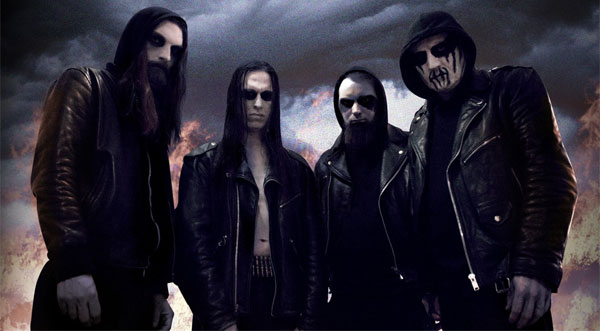 F.F.: You used a very interesting cover artwork for the album, done by Simon Bossert of Metal Artworks. How does it connect with music and lyrics? How did you come in contact with Simon?Krieg
F.F.: You used a very interesting cover artwork for the album, done by Simon Bossert of Metal Artworks. How does it connect with music and lyrics? How did you come in contact with Simon?Krieg: Simon is the guitarist in the German black metal band
Totengeflüster who we played alongside at Beermageddon Festival in Bromsgrove. From our meeting I became aware of his album artwork he had already created for some very big names like
Keep Of Kalessin,
Imperium Dekadenz,
Necronomicon and more and asked him if he could create the album front cover for us. I found it easier to communicate and work with Simon face to face to help him create my ideas and visualisation and so I travelled to Stuttgart to work on the front cover at his studio. I wanted something less obvious and not what people would be expecting from us for the album cover and the execution of Sophie Scholl gave me the idea of the guillotine as the central image. The rest of the image represents the destruction and devastation of war.
F.F.: The album was released by Non Serviam Records, a label which recently put out some great black and death metal albums. How are you satisfied with their work so far, and how it's with a relation between the label and the band? Krieg: We feel that Non Serviam Records is a great label for us as our music fits very well, alongside the other artists they have. Ricardo, the label boss, came to watch us at our gig at Incineration Festival 2017 in London and it was a great opportunity to socialise, have beers and get to know him as a friend and not just a label boss. The label has helped to spread our name and music internationally and we have received some excellent reviews already from all corners of the globe.
F.F.: Stahlsarg performed in several concerts prior to the release the debut album. What drives you the most when touring? How do you prepare for the gigs and what can the audience expect from Stahlsarg on stage?Eisenfaust: We put in a lot of prep before every show. We've always gotten together weekly so that we can just play - it helps us all stay on the same page and know one another's likes and dislikes inside out. We have our favourite tracks, sure, and this always comes into helping us build a set list, which we'll then practice regularly on the run up to a show o
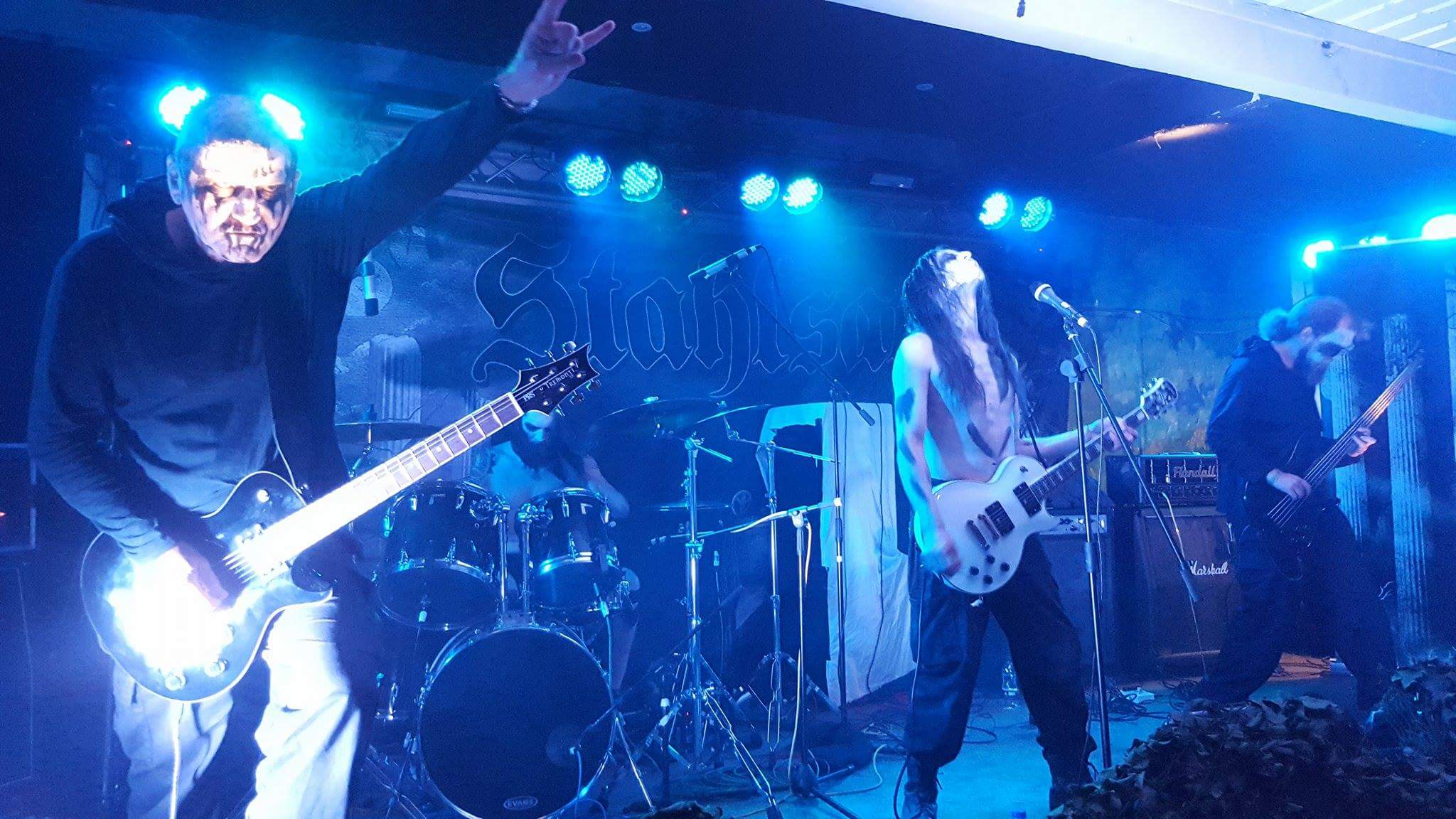
r string of shows. Like any band, we aim to put on a great gig whenever we play, and that goes for the first show of a tour right through to the last. We use visuals to add drama and channel the atmosphere we're trying to create with our music, which takes some work to pull off, and a lot of thought goes into how we can create the energy on stage to complement some of the high tempo tracks as well as cater to those slower grooves. We use low lighting, pinspots and smoke to try and build a very moody and tense stage environment.
F.F.: I have heard of black metal bands that have reached a certain level of world renown and because of this they are pejoratively called "pop" bands, alluding to the mass of followers, the grandeur and money involved in performing albums and shows. What's your opinion about this?Krieg: Within the genre most of the bigger bands we have supported (there are some exceptions) typically struggle financially and so we are all part of “the underground” that we are all supposed to support. A lot of bigger bands have to have jobs like we all do in order to help support their passion. Some people in the genre can be very quick to make judgements on a band’s recent commercial success despite them having many years of losing money and putting their whole life into their art form. It seems hypocritical when they do get a break that those people that say we should support the underground are very quick to write off these bands as sell outs. The industry needs these ”big ticket sellers” to support the festivals and touring circuits. They are also needed to draw the crowds and to give opportunities to smaller bands to present their music to a bigger audience when they support them.
F.F.: With all the baggage of shows and direct contact with fans from different places, with peculiar customs, what is your perception of the fans' understanding? In relation to the lyrics of the songs, is the majority only there for the instrumental part, or can you see that they embrace a new kind of attitude, much more rational than traditional society?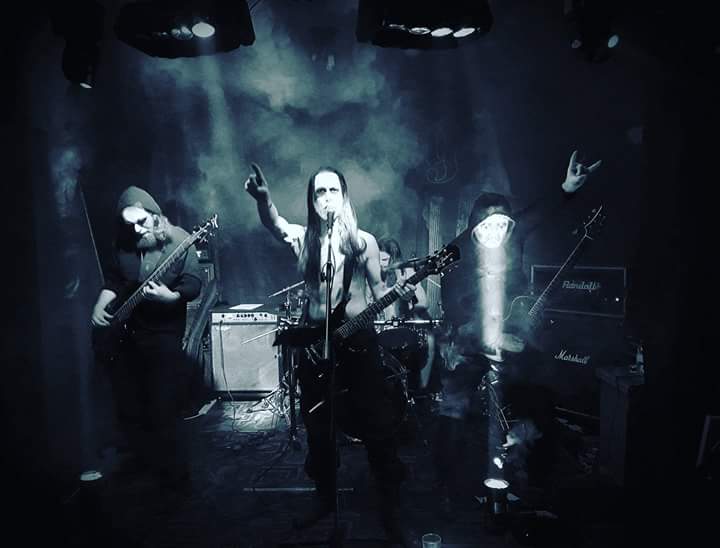 Krieg
Krieg: I may be wrong but I feel the majority of the fans who listen to our music are more focussing on the music and less on what the songs are written about. In this album we do have footnotes with some brief information of what each song is about so if people wanted to read further about the song’s subject and learn more, they can. I never want to force this on people but as I like to write about people/events/campaigns that interest me I feel there must be others out there that would also find it interesting and so I’ve tried to make it easier for them by including this additional information in the album booklet. WW2 European history is my passion and interest and I wouldn’t be able to write about another subject as I don’t feel I would be able to do it any justice.
F.F.: Concerning all the events that are taking place in our world, in all spheres, what are your thoughts regarding the perspectives of humanity and especially in relation to the hordes of young people who despite having an outward appearance of rebellion are the mirror of the prejudice and social conformity?Krieg: People end up conforming with what they have been subjected to and if they are wise enough to read and research further, they may end up having a different opinion to their peers than what they originally started off with. People like to feel a part of something and have slogans and this gives them a sense of belonging. For myself I like to understand both sides of a coin and read as much as I can in order to make a proper well informed choice.
F.F.: Analysing the black metal genre, from the moment you started listening to the earliest albums that inspired you to this day, where do you focus now, do you think the genre has grown in terms of more serious and meaningful approaches? What has changed and what would be interesting to change?Krieg: There are far more facets to black metal than there ever has been. There will always be people who want to try and regenerate how it started, others will want variations of it and yet it is continually developing and growing as bands find their own interpretation of what it means to them. For myself I like to have some mix of death metal as variation and I like to add in atmospheres that wouldn’t necessarily fit with other black metal bands. The good thing about the genre is it does give me plenty of scope with my writing.
F.F.: There is still a lot of discussion regarding Christian black metal bands around. Just as there is a lot of prejudice about the old black metal school and the new, progressive genres. What are your thoughts on these issues?Krieg: I don’t choose to listen to bands depending on their religious perspective, whether it is pro-religion or anti-religion, it is not on my radar. If I like the sound and songs of a band then I will buy their albums and listen to them.
F.F.: What was or were the albums that made you change the way you see music? What was the trigger that made you start the sonic journey?Krieg:
Emperor’s
Nightside Eclipse album has had a massive influence on me, although we don’t sound like them, we take influence from them in the way they capture atmosphere and build drama. Other bands that I have taken inspiration from are
Hypocrisy and
Paradise Lost. They both have atmosphere in their music that inspire me and my song writing. A lot of people who are into black metal would still cite bands like
Fields Of The Nephilim,
Christian Death and
Bauhaus as bands they liked and influenced them and I am one of those people. One of the great things about goth music is they would use different guitar pedals like chorus, delays, flanger and others which are not typically used that much in black metal. We use these as a way of creating a unique sound and to try and stand out from our contemporaries.
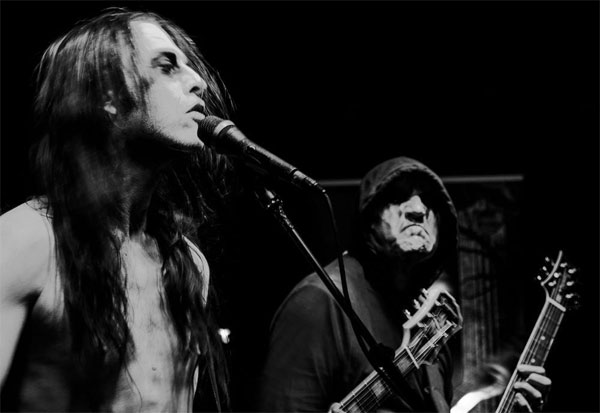 F.F.: Talking about the future now. What can fans expect from Stahlsarg? Is maybe a new album coming in 2018?Krieg
F.F.: Talking about the future now. What can fans expect from Stahlsarg? Is maybe a new album coming in 2018?Krieg: Our final show for this year is supporting
Saille in London at the Black Heart and we have already started booking festivals for next year. The album has only just come out on Halloween so we will be looking to have a third album probably in 2019. We are looking to work with Jon Phipps on this album who recently was involved in the orchestration on the new
Moonspell album so this should add a new sound to our music. Next year we will be focussing on playing as many shows, festivals and tours we can, to try and spread our name and allow people to hear the new album.
F.F.: And what are the long-term plans? Is there any country outside the European black metal core that would be interesting to tour? What could be a challenge?Krieg: We have played several European countries already on tours and festivals such as Inferno Metal Festival in Norway and Kings of Black Metal in Germany but if we were to play somewhere different I suppose South America would be an interesting place to play. I suppose with the cost of flights and visas this would probably be fairly prohibitive. However our producer is actually touring there now as we speak with the band Criminal and they seem to be getting some massive crowds so the demand is obviously there for extreme metal. Playing America would obviously be another cool place to play which we have not ventured to yet so who knows.
F.F.: I would like to leave the last words to you. Is there anything more to say about the album, the upcoming shows, and what’s to expect of Stahlsarg?Krieg: Also thank you very much for giving us this opportunity to let our voice be heard. Anyone who is interested in listening to the album after reading this can check us out on Spotify, You-tube or our Facebook page or it can be bought from all retail channels. We aim to take the band to as many countries as we can in 2018 so if there any promoters reading this then do get in touch.

Stahlsarg links: Official website, Facebook
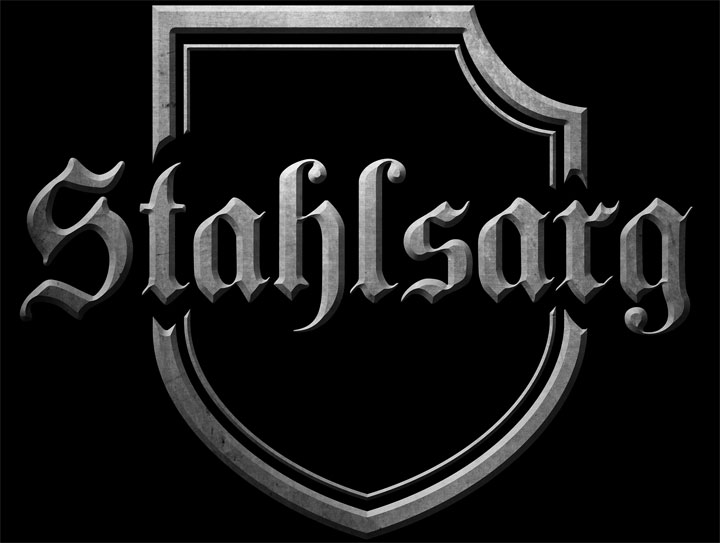

 From UK comes Stahlsarg to the European black metal scene, like a bomb crushing everything in front of them they deliver a massive sound that blends technical, yet atmospheric black metal with blasting death metal. The band was formed in 2013 and almost immediately took to the road to travel through the UK and Europe sharing their black metal sound on the stage. After supporting pioneers of Norwegian black metal, Mayhem, on their sole UK date in London, storming Belgium with Italian black metallers Handful Of Hate and joining black metal band Excruciate 666 in France, they were also honoured to grace the Sophie Lancaster stage at Bloodstock 2014, warming up the crowd for Satan, enjoyed Beermageddon Festival in Birmingham and Belgium’s No Compromise Metal Festival alongside headliner Crystal Viper, they finally released their debut album, Comrades In Death, via the Danish label Mighty Music in October 2015. Now, two years after and many gigs in between, Stahlsarg released the magnificient second album, Mechanisms Of Misanthropy, through the mighty Non Serviam Records on 31st October 2017. The album features a guest vocal from Kim Dylla (A Winter lost, Gwar, Kung Fu Dykes) and an arrangement from Brian Moss from Vicious Pink. This is a black metal album where all the instruments have found a particular equilibrium proportioning definition to each song generated (read the review over HERE). Stahlsarg's line-up consists of Eissturm (vocals/guitar), Krieg (guitar), Destruction (bass) and Eisenfaust (drums). Read the interesting interview done with bands guitarist Krieg and drummer Eisenfaust, and discover more about this band which is on a mission to conquer the European extreme metal scene.
From UK comes Stahlsarg to the European black metal scene, like a bomb crushing everything in front of them they deliver a massive sound that blends technical, yet atmospheric black metal with blasting death metal. The band was formed in 2013 and almost immediately took to the road to travel through the UK and Europe sharing their black metal sound on the stage. After supporting pioneers of Norwegian black metal, Mayhem, on their sole UK date in London, storming Belgium with Italian black metallers Handful Of Hate and joining black metal band Excruciate 666 in France, they were also honoured to grace the Sophie Lancaster stage at Bloodstock 2014, warming up the crowd for Satan, enjoyed Beermageddon Festival in Birmingham and Belgium’s No Compromise Metal Festival alongside headliner Crystal Viper, they finally released their debut album, Comrades In Death, via the Danish label Mighty Music in October 2015. Now, two years after and many gigs in between, Stahlsarg released the magnificient second album, Mechanisms Of Misanthropy, through the mighty Non Serviam Records on 31st October 2017. The album features a guest vocal from Kim Dylla (A Winter lost, Gwar, Kung Fu Dykes) and an arrangement from Brian Moss from Vicious Pink. This is a black metal album where all the instruments have found a particular equilibrium proportioning definition to each song generated (read the review over HERE). Stahlsarg's line-up consists of Eissturm (vocals/guitar), Krieg (guitar), Destruction (bass) and Eisenfaust (drums). Read the interesting interview done with bands guitarist Krieg and drummer Eisenfaust, and discover more about this band which is on a mission to conquer the European extreme metal scene. Eisenfaust: We had a vision, and trying to achieve that definitely pushed us out of our comfort zone at times. I'd be lying if I said this album wasn't hard work - and that's what's made the finished product so rewarding. As well as striving for a balance of heavy riffs with fast drum beats and a slower groove, we wanted to tell a story. We were meticulously writing parts together to create drama, and atmosphere, bouncing off one another and having input across each other's instruments. We fed off each other, of course, but working with Danny meant that we had this extra sounding post. Not only did he approach the recording and production with an open-mindedness that afforded us the opportunity to almost experiment with all the layers and added parts; but he was ready to critique and push us into getting the best out of the band, whilst staying true to what we all hoped our album would be.
Eisenfaust: We had a vision, and trying to achieve that definitely pushed us out of our comfort zone at times. I'd be lying if I said this album wasn't hard work - and that's what's made the finished product so rewarding. As well as striving for a balance of heavy riffs with fast drum beats and a slower groove, we wanted to tell a story. We were meticulously writing parts together to create drama, and atmosphere, bouncing off one another and having input across each other's instruments. We fed off each other, of course, but working with Danny meant that we had this extra sounding post. Not only did he approach the recording and production with an open-mindedness that afforded us the opportunity to almost experiment with all the layers and added parts; but he was ready to critique and push us into getting the best out of the band, whilst staying true to what we all hoped our album would be. F.F.: You used a very interesting cover artwork for the album, done by Simon Bossert of Metal Artworks. How does it connect with music and lyrics? How did you come in contact with Simon?
F.F.: You used a very interesting cover artwork for the album, done by Simon Bossert of Metal Artworks. How does it connect with music and lyrics? How did you come in contact with Simon? r string of shows. Like any band, we aim to put on a great gig whenever we play, and that goes for the first show of a tour right through to the last. We use visuals to add drama and channel the atmosphere we're trying to create with our music, which takes some work to pull off, and a lot of thought goes into how we can create the energy on stage to complement some of the high tempo tracks as well as cater to those slower grooves. We use low lighting, pinspots and smoke to try and build a very moody and tense stage environment.
r string of shows. Like any band, we aim to put on a great gig whenever we play, and that goes for the first show of a tour right through to the last. We use visuals to add drama and channel the atmosphere we're trying to create with our music, which takes some work to pull off, and a lot of thought goes into how we can create the energy on stage to complement some of the high tempo tracks as well as cater to those slower grooves. We use low lighting, pinspots and smoke to try and build a very moody and tense stage environment. Krieg: I may be wrong but I feel the majority of the fans who listen to our music are more focussing on the music and less on what the songs are written about. In this album we do have footnotes with some brief information of what each song is about so if people wanted to read further about the song’s subject and learn more, they can. I never want to force this on people but as I like to write about people/events/campaigns that interest me I feel there must be others out there that would also find it interesting and so I’ve tried to make it easier for them by including this additional information in the album booklet. WW2 European history is my passion and interest and I wouldn’t be able to write about another subject as I don’t feel I would be able to do it any justice.
Krieg: I may be wrong but I feel the majority of the fans who listen to our music are more focussing on the music and less on what the songs are written about. In this album we do have footnotes with some brief information of what each song is about so if people wanted to read further about the song’s subject and learn more, they can. I never want to force this on people but as I like to write about people/events/campaigns that interest me I feel there must be others out there that would also find it interesting and so I’ve tried to make it easier for them by including this additional information in the album booklet. WW2 European history is my passion and interest and I wouldn’t be able to write about another subject as I don’t feel I would be able to do it any justice. F.F.: Talking about the future now. What can fans expect from Stahlsarg? Is maybe a new album coming in 2018?
F.F.: Talking about the future now. What can fans expect from Stahlsarg? Is maybe a new album coming in 2018?